3 Chicks and one to go!
May 12, 2017 in In the Nest Box
May 12, 2017 in In the Nest Box
May 12, 2014 in In the Nest Box
May 8, 2014 in In the Nest Box
May 5, 2014 in In the Nest Box
May 4, 2014 in In the Nest Box
Newly hatched chic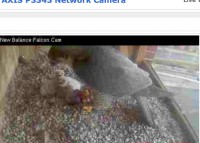 ks weigh about 1.5 ounces and are virtually blind. Covered with only a light coat of fluffy white down, newborn chicks require constant brooding by the female in order to stay warm. Feeding usually commences on day two when the small chick bobs its head looking for food. The female provides small pieces of food for the chicks!
ks weigh about 1.5 ounces and are virtually blind. Covered with only a light coat of fluffy white down, newborn chicks require constant brooding by the female in order to stay warm. Feeding usually commences on day two when the small chick bobs its head looking for food. The female provides small pieces of food for the chicks!
May 1, 2014 in In the Nest Box
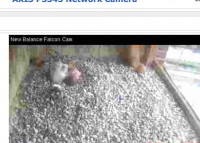 Hatching begins after 30+ days when the chicks hammer a hole in the egg with a special “egg tooth” on the end of its beak. The chick makes a neat cut all the way around the egg, essentially cutting off the large end of the egg. This process may take up to 48 hours and requires a great deal of energy!
Hatching begins after 30+ days when the chicks hammer a hole in the egg with a special “egg tooth” on the end of its beak. The chick makes a neat cut all the way around the egg, essentially cutting off the large end of the egg. This process may take up to 48 hours and requires a great deal of energy!
April 28, 2014 in In the Nest Box
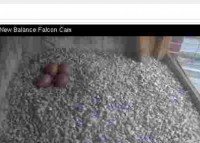 The peregrine falcon couple living in an 8th floor falcon condo in the Ayer Mill Clock Tower will soon welcome their 2014 chicks, or eyases, to the city of Lawrence. The female has laid 4 eggs this year, and we are now at the back end of the normal incubation period of 29-33 days.
The peregrine falcon couple living in an 8th floor falcon condo in the Ayer Mill Clock Tower will soon welcome their 2014 chicks, or eyases, to the city of Lawrence. The female has laid 4 eggs this year, and we are now at the back end of the normal incubation period of 29-33 days.
Falcons will eventually get rid of eggs if they do not hatch. Two years ago, the couple laid 4 eggs but only 2 eggs hatched. They waited a few weeks before discarding the 2 unhatched eggs.
The first egg was laid March 21 this year! Incubation of the 4 eggs started after the last egg was laid on March 26th. Stay tuned!
April 26, 2014 in In the Nest Box
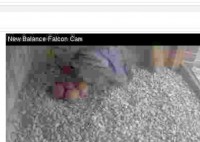 As of 6:15 pm Saturday night, we continue the vigil awaiting the hatching of the first falcon egg! In the worth noting department: from time to time, the birds stand up and rotate the eggs. This is an important chore, as it ensures that the eggs are uniformly warmed and prevents the embryos from sticking to their shell, which could be a problem during hatching.
As of 6:15 pm Saturday night, we continue the vigil awaiting the hatching of the first falcon egg! In the worth noting department: from time to time, the birds stand up and rotate the eggs. This is an important chore, as it ensures that the eggs are uniformly warmed and prevents the embryos from sticking to their shell, which could be a problem during hatching.
An egg is an amazing creation. It is fragile enough for a tiny chick to peck its way out, yet strong enough to withstand the weight of an incubating adult. That wasn’t always true. According to the staff at the Peregrine Fund in Idaho, in the 1960s, scientists discovered that the pesticide DDT caused physiological problems in female Peregrine Falcons, resulting in thin-shelled eggs that broke during incubation.
DDT was banned in 1972 and The Peregrine Fund helped recover this once-endangered species with captive breeding and releases to the wild. It was one of the most successful conservation efforts in history!
April 26, 2014 in Near the Clock Tower
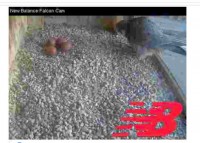 The Peregrines have been incubating the 4 eggs hatched during the 3rd and 4th week of March. The estimated incubation period runs normally between 29-33 days. As of Friday afternoon, at the 30 day mark, all 4 eggs were seen and documented with this photograph. These eggs are ready to hatch and hatching should take place today or next few days! Stay tuned!
The Peregrines have been incubating the 4 eggs hatched during the 3rd and 4th week of March. The estimated incubation period runs normally between 29-33 days. As of Friday afternoon, at the 30 day mark, all 4 eggs were seen and documented with this photograph. These eggs are ready to hatch and hatching should take place today or next few days! Stay tuned!
May 11, 2012 in In the Nest Box